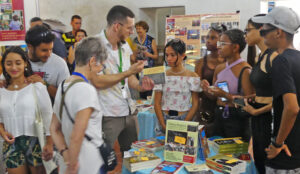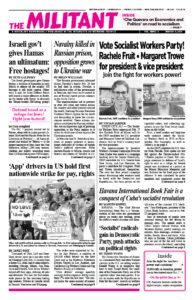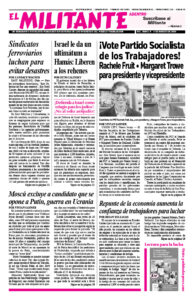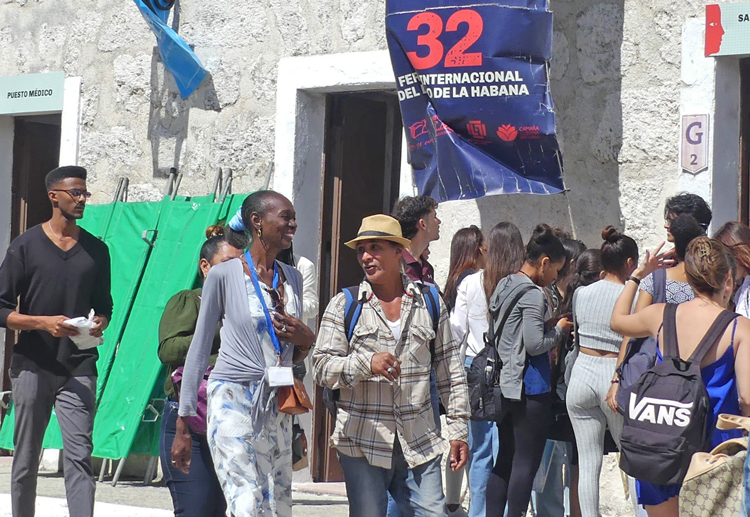HAVANA — The 32nd Havana International Book Fair is a “demonstration of the value our government places on books and reading, given the difficult world situation and intensification of the criminal U.S. blockade,” Juan Rodríguez, president of the Cuban Book Institute, said at its Feb. 15 inaugural event.
Tens of thousands of people have streamed through the fair during its opening days. The annual event is Cuba’s largest cultural festival, with literature displays, poetry readings, art exhibits, film showings, children’s activities, theater, dance and music. After 10 days in Havana, Cuban publishers who are part of the fair will travel to provinces across the island, concluding in Santiago de Cuba in late March.
The book fair is a conquest of Cuba’s socialist revolution. It is a product of the fact that working people, led by Fidel Castro, took state power in 1959 and began to transform society and themselves. They used that power to mobilize tens of thousands of young volunteers into a campaign that wiped out illiteracy in 1961, and over the decades broadened access to education and culture in city and countryside. Cuba today has a literacy rate that is among the world’s highest.
“Every year the book fair is an event everyone in Cuba is talking about. I always make plans weeks in advance to attend and bring my family,” Jorge López, a waiter at a Havana restaurant, told the Militant.
The inauguration was attended by President Miguel Díaz-Canel, other Cuban government figures and prominent writers, as well as by a delegation from Brazil, this year’s country of honor, which included Minister of Culture Margareth Menezes. Publishers from 46 countries are participating, Rodríguez reported. Cuban publishers are offering 3 million books and 2,000 digital titles to fair-goers.
In the face of Washington’s more than six-decade-long economic war, resulting in extremely scarce paper and printing supplies, fuel and other necessities, the Cuban government has devoted significant resources to make possible this production of reading material.
‘A single revolution’
Among the titles being presented are several on Cuba’s revolutionary history. One is Una sola revolución (A Single Revolution), published by Ediciones Alejandro of the Fidel Castro Center, established in 2021. The book amplifies one theme of the recent speech given by Army Gen. Raúl Castro on the 65th anniversary of the revolution. He said the Jan. 1, 1959, triumph of the Rebel Army was the victory “of the only revolution that ever existed in Cuba,” beginning with the 19th century wars for independence from Spanish colonial rule and against slavery, and culminating some 90 years later in the first socialist revolution in the Americas. (See the Feb. 5 Militant for Raúl Castro’s speech.)
Una sola revolución includes manifestos by leaders of Cuba’s independence wars, from Carlos Manuel de Céspedes to José Martí. It also features “History Will Absolve Me,” the courtroom speech Fidel Castro gave when he and other revolutionaries were convicted for the July 26, 1953, assault on the Batista dictatorship’s Moncada barracks. That speech popularized the program the revolutionary movement carried out to the end as working people took power.
“These documents point out the road to victory, and also the road to the future,” said René González Barrios, director of the Fidel Castro Center, who presented the new book.
The same event also launched La batalla de Santa Clara (The Battle of Santa Clara), by Aremis Hurtado, an e-book by Verde Olivo, the publishing house of Cuba’s Revolutionary Armed Forces. Through firsthand accounts, it tells the story of the December 1958 battle in the city of Santa Clara, led by Rebel Army commander Ernesto Che Guevara, that sealed the victory of the Rebel Army.

Che’s own account of that historic battle is told in Episodes of the Cuban Revolutionary War, which is among the more than 200 titles on display at the booth featuring books published by Pathfinder Press. The stand, which has attracted hundreds of visitors in the opening days, is staffed by volunteers, communist workers from the U.S., Australia, Canada and the United Kingdom.
One 2023 Pathfinder title drawing special interest is The Low Point of Labor Resistance Is Behind Us: The Socialist Workers Party Looks Forward by SWP leaders Jack Barnes, Mary-Alice Waters and Steve Clark. The publisher’s newest title is Che Guevara on Economics and Politics in the Transition to Socialism by Cuban writer Carlos Tablada, a new and expanded edition of the well-known book first published in Cuba in 1987 and an English translation by Pathfinder Press two years later.
‘Revolution gave me chance to fight’
This year’s book fair honors writers Francisco López Sacha and Isabel Monal. López Sacha, a novelist and art professor, told the Cuban press, “I actually began my experience as a teacher in 1961, when at age 11 I joined the literacy campaign in the Sierra Maestra mountains.”
Monal, founding editor of the journal Marx Ahora (Marx Today), is known in Cuba as a tireless defender of Marxism, who insists readers study the writings of Karl Marx and Frederick Engels themselves, as opposed to distortions and falsifications found in “manuals” from the former Soviet Union.
As a young woman, Monal was a partisan of the July 26 Movement, which led the struggle that toppled the U.S.-backed Fulgencio Batista regime. In late December 1958, when she was an exchange student in the United States, she was arrested by U.S. immigration cops and jailed in the small town of Hillsboro in southern Ohio for transporting guns to Cuba’s rebel forces. Days later, the tyranny was overthrown, and she was soon freed to return home.
As part of the Havana book fair, a tribute to Isabel Monal’s lifelong work was held Feb. 17. Above all, said Monal in her remarks at the end of the program, “The Cuban Revolution gave me the opportunity to fight.” The event presented her book, Ensayos americanos (American Essays), a collection on Latin American history.
International conference
Just prior to the book fair, a three-day conference was held in Havana sponsored by the magazine Cuba Socialista, published by the Central Committee of the Cuban Communist Party. The gathering, the Second International Meeting of Theoretical Publications of Parties and Movements of the Left, drew some 150 participants.
The majority of conference delegates were from Communist Parties in Europe and Latin America, with a number also from organizations in the United States, Canada, Australia, Vietnam, Laos, China and Zimbabwe.
As summarized on the website of the Cuban Communist Party, “The Israeli government’s genocide against Palestine was the main axis of discussion throughout the event,” and conference organizers issued a “Declaration in solidarity with the Palestinian people” on the final day.
Virtually all participants who spoke on Israel and Palestine voiced support for Hamas’ course, presented as “resistance” by the entire Palestinian people to Jews who have settled on Arab land.
Steve Clark, from the National Committee of the Socialist Workers Party, was the only delegate who voiced disagreement. In brief comments, he explained why he could not support the final declaration.
Clark pointed to the stakes for the international working class in the fight against Jew-hatred and pogroms such as the Oct. 7 assault on Jews in Israel led by Hamas. Israel’s right to exist and defend its existence, he said, had been settled by the history of the 20th and 21st centuries, including the Holocaust and the refusal of Washington, London, and other imperialist powers in the 1940s to open their doors to its survivors. His remarks were met by angry chants of “From the river to the sea, Palestine will be free,” the only heated moment of the conference.
Interest in class struggle in U.S.
At the Pathfinder stand at the book fair, titles like The Low Point of Labor Resistance Is Behind Us have sparked visitors’ interest to learn about unionists in the U.S. and elsewhere who are telling bosses “Enough!” and fighting attacks on their living standards, job conditions and dignity.
Some have also asked what’s behind the Democratic Party’s efforts to block their rival Donald Trump from running in the presidential election, and are interested in hearing that these are assaults on the constitutional freedoms of working people. Discussions have also taken up the sharpening crises of world capitalism, including the rising threat of imperialist wars. An upcoming article will report further on these exchanges.


